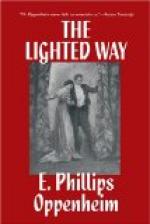He laughed, not altogether easily, with a note half of resentment, half of protest.
“Dear Ruth,” he pleaded, “what have I done to deserve this? Nothing has happened to me that I will not tell you about. You have been sitting here alone, fancying things. And I have news—great news! Wait till you hear it.”
“Go on,” she said, simply. “Tell me everything. Begin at last night.”
He drew a little breath. It was, after all, a hard task, this, that lay before him. Last night in his mind lay far enough back now, a tangled web of disconnected episodes, linked together by a strangely sweet emotional thread of sentiment. And the girl was watching his face with every sense strained to catch his words and the meaning of them. Vaguely he felt his danger, even from the first.
“Well, I got there in plenty of time,” he began. “It was a beautiful house, beautifully furnished and arranged. The people were queer, not at all the sort I expected. Most of them seemed half foreign. They were all very hard to place for such a respectable household as Mr. Weatherley’s should be.”
“They were not really, then, Mr. Weatherley’s friends?” she asked quietly.
“As a matter of fact, they were not,” he admitted. “That may have had something to do with it. Mrs. Weatherley was a foreigner. She came from a little island somewhere in the Mediterranean, and is half Portuguese. Most of the people were there apparently by her invitation. After dinner—such a dinner, Ruth—we played bridge. More people came then. I think there were eight tables altogether. After I left, most of them stayed on to play baccarat.”
Her eyes still held his. Her expression was unchanged.
“Tell me about Mrs. Weatherley,” she murmured.
“She is the most beautiful woman I have ever seen. She is pale and she has strange brown eyes, not really brown but lighter. I couldn’t tell you the color for I’ve never seen anything else like it. And she has real red-brown hair, and she is slim, and she walks like one of these women one reads about. They say that she is a Comtesse in her own right but that she never uses the title.”
“And was she kind?” asked Ruth.
“Very kind indeed. She talked to me quite a good deal and I played bridge at her table. It seems the most amazing thing in the world that she should ever have married a man like Samuel Weatherley.”
“Now tell me the rest,” she persisted. “Something else has happened—I am sure of it.”
He dropped his voice a little. The terror was coming into the room.
“There was a man there named Rosario—a Portuguese Jew and a very wealthy financier. One reads about him always in the papers. I have heard of him many times. He negotiates loans for foreign governments and has a bank of his own. I left him there last night, playing baccarat. This morning Mr. Weatherley called me into his office and sent me up to the Milan Restaurant with a strange message. I was to find Mr. Rosario and to see that he did not lunch there—to send him away somewhere else, in fact. I didn’t understand it, but of course I went.”




